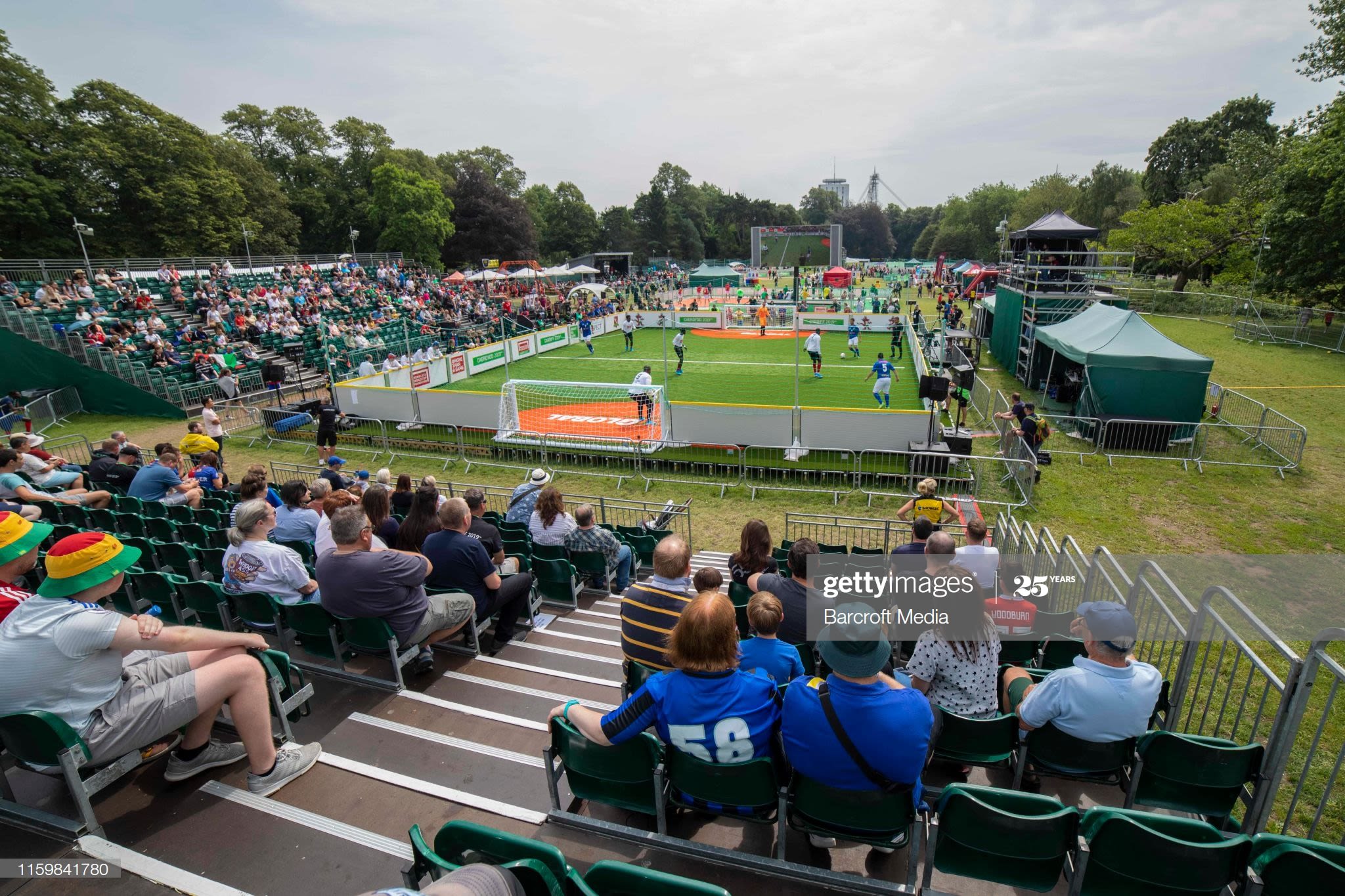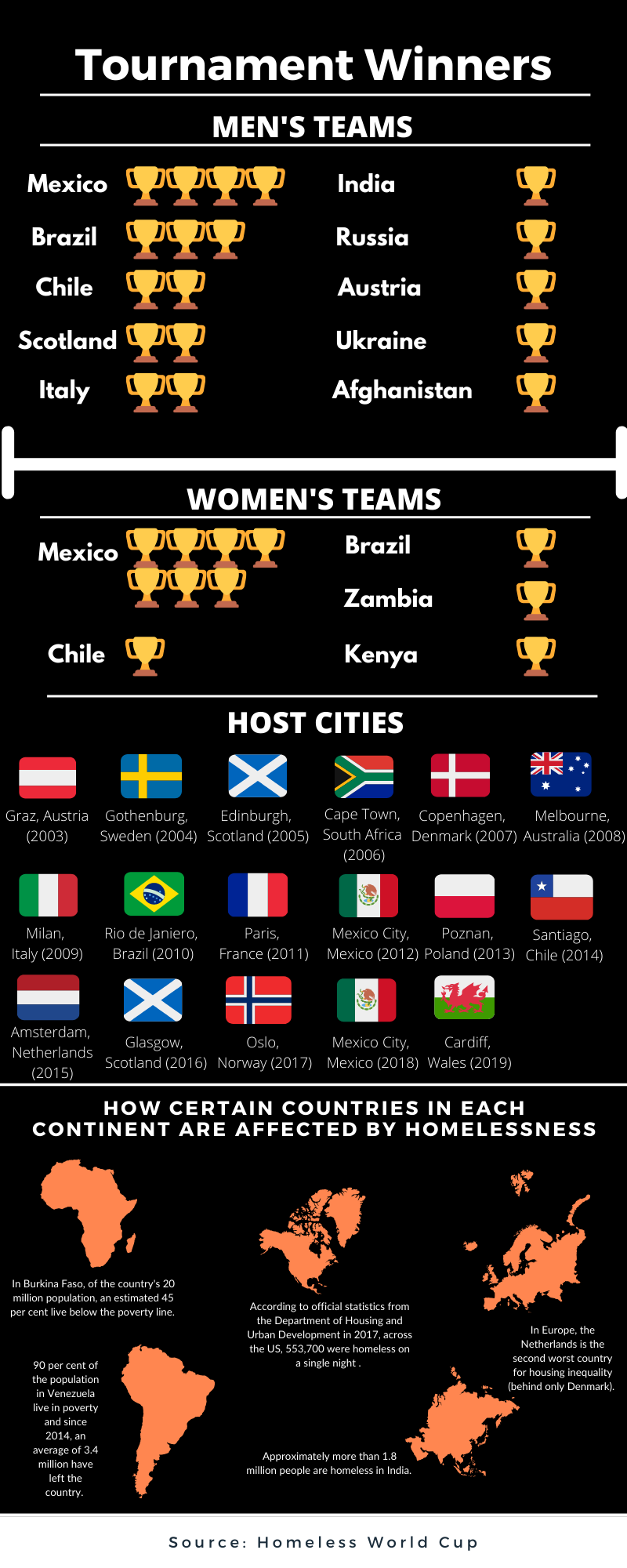How Does Sport Bring Communities Together?
Article No. 3: Inclusion

Title Picture - Cardiff, Wales, UK, August 3rd 2019. General view during the final day of the Cardiff 2019 Homeless World Cup in Bute Park. (Mark Hawkins/Composed Images / Barcroft Media via Getty Images)
Harry Crowe investigates the importance and significance of how sport and physical activity can benefit people and communities through a range of social and cultural outcomes and what more needs to be done to help further raise awareness. This article focuses on the Homeless World Cup.
“Our digital footprint of that event was massive. It was the biggest one we’ve had yet.
“I think it was really successful,” says Mariana Mercado, a Communications Manager at the Homeless World Cup, on the 17th edition of the tournament which was held in the Welsh Capital at Bute Park - the 'green heart' of the city.
Spearheaded by Hollywood actor Michael Sheen, the thousands of spectators who attended the week-long event witnessed a sporting bonanza like no other.
A survey, from the 2019 Homeless World Cup, highlighted 'over 90 per cent of spectators now have a more positive attitude towards homeless people' and '83 per cent were proud their city was hosting the event'.
“That is what Cardiff was really good for because we had a lot of patronage from quite a few famous household names and the media coverage was amazing,” adds Mariana.
“We always engage in professional broadcast companies to try and give the event the feel of a professional sporting event. We like our players to be perceived as athletes. We make that stream available to anyone who wants it free of charge and we try to share it as much as we can. The media coverage has been growing every year.”
Though, despite raising significant awareness surrounding homelessness, Cardiff was not the most highly attended event in the history of the competition. “In terms of people on the ground, it wasn’t the biggest event we’ve had,” she said.
“We definitely had more people in Mexico 2012 or even in Melbourne in 2008. In Glasgow 2016, we were in George Square, so it was really busy all day because we were right in the city centre, so it just really depends on what the venue is and where its located in the city.”
'80,000 fans were in attendance in Glasgow and more than 30 million viewers engaged online', according to a study from Pro Social Valuation.
But how did the Homeless World Cup come into fruition?
Cape Town, South Africa, is where it all began in 2001. Co-founders Mel Young & Harald Peter Schmied ran an international street football paper conference about homelessness and came up with the idea over a beer. The next day they got to work.
18 months later...
“That translated into the first ever homeless world cup in 2003 in Graz (Austria) which was 18 teams altogether from mainly Europe,” adds Mariana.
“Since then, we’ve had an event every year and the foundations have grown into what it is today. Historically, now bringing in teams from more than 50 countries, 64 teams from around the world, involving around 500 players each year. I’m working by-network off 74 countries.”
12 years ago, in Melbourne, the first women's competition took place and it featured eight teams altogether.
In a highly anticipated all-African final, which occurred down under between Liberia and Zambia, the latter made history as the inaugural 'Women's Homeless World Cup Champions'.
Since then, the women's game has grown to 16 teams, while the men's competition has 48.

“Working at the Homeless World Cup, there’s always this idea of let’s go somewhere really cool and exotic and if you live in the UK, you excited to go to Fiji or somewhere like that,” says Mariana.
“It’s kind of decided until the host cities are interested in bringing it but if we could make an active approach to maybe take it to more African nations or even in Asia, because we haven’t had it in Asia yet.
“But it’s just a matter of also understanding the realities of hosting an event of that size and which host cities are willing to have it and we have a whole host city procedure, like a bidding process similar to the Olympics and the cities are selected based on viability and which is the best bid. Ideally, hopefully one day we’ll be able to bring it to Asia.”
Due to the COVID-19 pandemic, this year's competition scheduled in Tampere, Finland was postponed.
Whilst that decision left a sour taste for many, the organisation decided to host for the first time a 'Homeless World Cup Day', which will commence on July 5.
This is a chance to celebrate their achievements and the work of Street Football Partners by joining a 'Virtual Stadium' to view influential stories from all corners of the globe.
Mariana has worked at the Homeless World Cup since 2015 and hopes these events can 'challenge and change people’s perceptions about homelessness'.
She said: “In addition to help people who are homeless make positive changes in their lives is also to highlight the issues about homelessness and what inclusion in sport means because the more you learn about homelessness, the more you know that it’s not an issue in isolation it’s a whole intersectionality issues that go around it and especially around the world, homelessness looks vastly different from country to country and its trying to bring a highlight to that and understanding what the best approach is to tackle it and it might not be the same case in every country.”
Mariana also praised the work ethic and importance of volunteers at each tournament, adding: “We are a very small organisation and in the homeless world cup foundation, there is only six of us, full time employed. We work in coordination with the local organiser committee every year to deliver the event to that host city. I would say about 90 per cent of the event is volunteer rep. If it wasn’t for volunteers, we would not be able to hold the event.
“The fact that there is always such high community engagement is fantastic that so many volunteers take so much time and they give us all their skill and good will. I can tell you that in Glasgow 2016, we had about 400 volunteers who engaged for the week of the event. In Cardiff, we didn’t have that many, it was about 200 so it changes depending on the event and the city. But every year, we get very committed volunteers and we would not be able to do it without them.”
